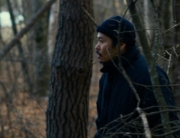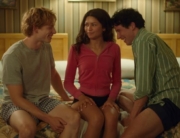![]() In the world of French playwright-director-screenwriter Marcel Pagnol, “provincial” is anything but a bad word. Instead, it’s the very essence of his art, best known for
In the world of French playwright-director-screenwriter Marcel Pagnol, “provincial” is anything but a bad word. Instead, it’s the very essence of his art, best known for
the rich, humanist character studies that make up his Fanny trilogy. And that’s what actor Daniel Auteuil gets exactly right in his directorial debut, a remake of Pagnol’s The Well-Digger’s Daughter (filmed originally in 1940). It can be described as old-fashioned without being in the least pejorative.
The plot of The
Well-Digger’s Daughter
is typical Pagnol. Set in his beloved Provençal countryside before World War II, the movie revolves around Pascal, a middle-aged, widowed well-digger with six daughters ranging in age from 3 to 18. The oldest, Patricia—sent off to live with a family in Paris years earlier so she could receive a good upbringing and education—has returned to look after her younger sisters and father after her mother’s death.
One day while taking lunch to her father, Patricia meets Jacques, the handsome, dashing son of the town’s well-to-do shopkeeper, M. Mazel. The attraction is immediate and obvious. When Jacques takes Patricia home after her awkward date with her dad’s work partner, the well-meaning but oafish and middle-aged Felipe (he’s perfect husband material, so her father thinks), he sweet-talks her into having sex with him—and two completely antithetical families are irrevocably changed.
Patricia discovers that she’s pregnant after being stood up by Jacques (she’s unaware that he was called away to the war earlier than expected). When she confesses her situation to her father, he responds the only way a commoner knows how: he takes his family to the Mazel household to ask them to recognize Patricia’s unborn child as their son’s. When they refuse (Jacques’ mother accuses Pascal of blackmail), he washes his hands of his eldest daughter—whom he earlier said he loved “as if she was a son”—and forces her to live with an aunt and to raise her child away from her shamed family.
Auteuil, who starred in two famous Pagnol adaptations directed by Claude Berri, Jean de Florette and Manon of the Spring, in the mid-1980s, shapes Pagnol’s material to create a moving, humane drama that in lesser hands might turn into mere soap opera. As director, Auteuil is overly fond of sweeping pans of the admittedly beautiful scenery (exquisitely photographed by Jean-Francois Robin), but since this is a story about particular people in a particular place (it’s commented more than once that Patricia has a “posh” Parisian accent, as opposed to the others’ working-class dialects), the visuals fit snugly, as does Alexandre Desplat’s orchestral score. Its beguilingly simple beauty, reminiscent of Erik Satie’s music, and complemented with several period songs to further provide atmosphere
And the characters are all treated equally affectionately. Jacques’ parents (Jean-Pierre Darroussin and Sabine Azéma, who wonderfully complement each other with his buttoned-down dignity and her high-strung emotionalism) act churlishly toward Pascal and Patricia, though they are never presented as villains. And when they receive official word that their son has been shot down behind German lines and is dead, the Mazels tentatively stop by to visit the young boy who may well be their grandson. The situation turns tense when Pascal becomes enraged by their appearance, believing they may try to take away a grandson he only recently (and grudgingly) accepted as a member of his family.
How these three parents respond to the loss of a child due to war or social disgrace is marvelously dramatized by Auteuil with appropriate understatement, particularly in his own performance as Pascal, who consistently changes his mind about his own feelings about his daughter and new grandson. Although he has a lot of dialogue, it’s often in the moments when he’s not speaking that Pascal’s true self emerges, and Auteuil displays that with a combination of virility and gracefulness.
Astrid Bergès-Frisbey’s Patricia is a sublime blend of teenage naïveté and mature womanliness. This teenager has been forced by circumstances to become an adult not once (after her mother’s death) but twice (after becoming a mother herself). Perhaps the film’s most remarkable shot occurs when Patricia waits for a rendezvous with Jacques and realizes that he is not coming—confirming her suspicion that he, the rich boy, has no real use for her, the poor girl—and the most touching mix of sadness and hopelessness comes across the young actress’s richly expressive face. That brief moment encapsulates the affection both Pagnol and Auteuil have for their “provincial” characters.






Leave A Comment